Invited Speaker---Assoc. Prof. Jianying Zhang

Department of mathematics, Western Washington University, USA
Biography: Jianying Zhang received her B.Sc. and M.Sc. both in applied mathematics at Tsinghua University, Beijing, China. She completed her Ph.D. in applied mathematics at University of California, Santa Barbara in 2002. During September – December 2002, she served as a core participant of IPAM long-term program “Mathematics in Nanoscale Sciences and Engineering” at Institute for Pure and Applied Mathematics (IPAM), University of California, Los Angeles. Then she went back to UCSB and worked as a postdoctoral researcher for half a year in the department of mechanical and environmental engineering, where her major research contributions were in shape optimizations of plate piezoelectric control and level set methods for numerical simulations. Right after, she held a PIMS/MITACS postdoctoral fellowship, at Pacific Institute for Mathematical Sciences (PIMS), University of British Columbia, Canada, where her major field of study was in computational fluid mechanics, specified in non-Newtonian fluid flows. She joined the department of mathematics at Western Washington University in 2006 and is now an associate professor. Her current research interests include numerical partial differential equations, simulation of complex fluid flows and mathematical biology. She has significant publications in Journal of Fluid Mechanics, Computer Methods in Applied Mechanics and Engineering, International Journal for Numerical Methods in Fluids, Numerical Methods for PDEs, Nonlinearity, the Bulletin of Mathematical Biology as well as International Journal of Bifurcation and Chaos. Meanwhile, she has presented and served as organizing committee member at various international conferences.
Speech Title: Meshless method for Bingham flow simulation
Abstract: Bingham fluids are non-Newtonian in the sense that the constitutive law has implicitly defined discontinuity, which forms the interface (termed “yield surface”) separating the liquid and solid phases in the underlying fluid. The major challenge of the corresponding numerical simulation is the detection of the yield surface up to desired resolution. Finite element method has been intensively applied due to its flexibility of local refinement. However, design of optimal mesh refinement strategies can become very technical for complicated physical domains especially for problems in 3D. We propose a meshless approach based on basis function expansion. Numerical results will be presented to showcase the cost-effectiveness of the proposed method. In addition, the dependence of the rate of convergence on the choice of basis functions will also be address.